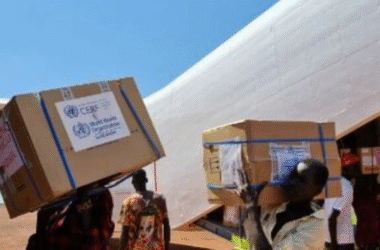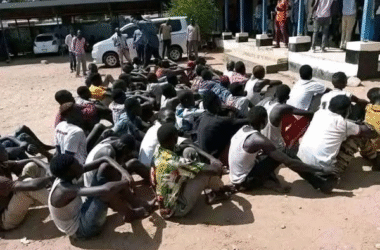By William Madouk
Pain, distress, and anxiety are what mark the lives of South Sudanese, who are battling soaring commodity prices amid biting inflation.
The depression is already taking toll on citizens, as Juba resident, only identified as Rejoice, narrates an ordeal of drenching her throat with salted water to survive.
Rejoice called No. 1 Citizen Daily Newspaper office line to testify on the economic situation that purges her without mercy.
“The market situation is very bad. I went to the market but couldn’t afford anything. I came back home. I took water plus salt and slept. But today I don’t know what I’m going to do,” she lamented.
According to the woman, due to rising commodity prices, the money she went with to the market, became insufficient to purchase food for the day.
On Tuesday, a Dollar sold at SSP 1,289, bank exchange rate, while SSP 1,450 in black market.
The depreciation of the South Sudanese Pounds (SSP) against the US dollar has catapulted prices, hence leading to financial shreds.
The phrase “failing to make ends meet” is now common as citizens get into a pattern where their income does not cover their monthly expenses.
One Juba resident, Angelo, not his real name, told No. 1 Citizen Daily Newspaper that the current trending economic situation is worsening.
“Unfortunately, we don’t even get a meal sometimes; food is now becoming for those with fortune,” moaned Angelo.
“The general economic situation is very bad, really very bad. For instance, there are people who have small businesses but still cannot manage to get what they want from the market,” he added.
Deprived of monthly salaries, he stated that the only solution to putting food on the table for family members is through borrowing and paying when one gets some money, as well as ‘part-time hustling’.
“The living condition for the common citizen is really very hard; it affected everything, including livelihood,” Angelo continued.
He noted that the lack of a decent job forces them to put other matters that they can’t afford aside.
“Like your child cannot go to school, you ask for school fees and uniforms, among others, and you can’t afford them,” the civil servant decried.
He appealed to the government to address the fluctuation of foreign exchange rates and fix market prices.
“Although they are affected too by the dwindling economic situation, but not to the extent of the common citizens, I urge them (the government) to do a market survey and see how citizens are suffering,” he stressed.
However, in a press release on Tuesday, the Bank of South Sudan (BoSS) said it ‘is closely monitoring the recent developments in the foreign exchange market’ and that ‘it remains committed to ensuring price stability and efficiency in the market’.
According to BoSS, intervention to stabilize the market would be through a monetary policy that strengthens SSP through a weekly auction of foreign exchange currency at a revised bank’s rate.
“The Bank of South Sudan assures the public that it is unequivocally committed to its mandate of ensuring price stability and a sound financial system in the country,” said Dr. James Alic, BoSS governor.
Meanwhile, the chairperson of the specialized committee for finance and economic planning in the national assembly, Changkouth Bichiock said that other countries are equally experiencing the pinch of rising Dollar rates.
“This exchange rate of the US dollar to SSP is not only for South Sudan but also for other countries like Kenya, Uganda, whatever you can name them,” he told this outlet in an interview.
He asserts that South Sudanese need to engage in domestic production of food in order to offset the negative impacts of foreign exchange rates.
“We need to produce, and we need to make our own food, because even the tomatoes and the water we are importing from somewhere. That is why we need dollars more than anything, but if we have them locally, we don’t need dollars,” he lamented.
On a spot market check yesterday, this outlet found out that the price of 50 kg of super maize flour, which used to cost SSP 40,000, has now increased to SSP 42,000.
Also, the price of 50 kg of beans has gone up from SSP 60,000 to SSP 61,000. A 20-litre Jerry cane of cooking oil that previously sold for 50,000 SSP now costs 51,500 SSP.
Besides, 1 kg of beef has increased from SSP10,000 to SSP10,500. However, the price of a bag of charcoal has remained at 10,000 SSP.
Mr. Robert Pitia, Central Equatoria State Chamber of Commerce chairperson, blamed the worrisome situation on the country’s financial institutions’ failures to control foreign exchange.
He said the central bank and Ministry of Finance have failed to deal with black market money speculators.
“It is the role of the central bank and the ministry of finance to control the exchange rate. We tried our best to talk to these money traders, but they still insist, so it is not our failure,” said Pitia.
Meanwhile, Prof. Abraham Matoc, an economic analyst and the Vice Chancellor of Dr. John Garang University, slammed both the government and the Chamber of Commerce for the ailing economy.
He criticized the government for failing to listen to the advice of centralizing the economy, which is not supposed to be a free market economy as is the case now.
He stressed that the government has the weakness of leaving market dealers to use money as a commodity, saying it is dangerous.
“How do we expect prices to come down if dealers are the ones controlling the market freely while the government sees?” Matoc quizzed.
“The dealers save money in both dollars and pounds at home; if they need pounds to be scarce, they release dollars, and the opposite is true,” he stated.
Edmund Yakani, the executive director of the Community Empowerment for Progress Organization (CEPO), in a recorded statement extended to this outlet, urged President Salva Kiir Mayardit to take immediate action to rescue the poor citizens from the worsening economic situation.
“I am appealing to H.E. the President and the Rt. Hon. Speaker with due respect and honor; we need urgent political leadership intervention on this pressing economic situation,” he appealed.
The activist said citizens are crying and asking their leaders that they need quick intervention and rescue from the biting economic situation.
“Some families are breaking down; children are getting to the streets. Children are dropping out of school, and some families are already losing the unity of a family,” Yakani painted the stark picture of the suffering citizen.
CEPO’s boss further urged the council of ministers to dedicate this Friday’s cabinet meeting to tackle the runaway inflation issue causing worrying trends among citizens.
He warned that the current economic hardship will breed a high rate of theft and looting as the poor are left with no decent option for survival.




